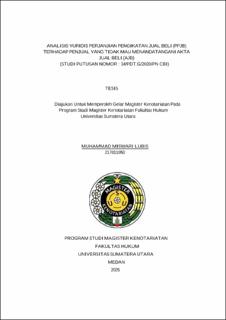| dc.contributor.advisor | Purba, Hasim | |
| dc.contributor.advisor | Ikhsan, Edy | |
| dc.contributor.author | Lubis, Muhammad Miswari | |
| dc.date.accessioned | 2025-06-20T03:56:30Z | |
| dc.date.available | 2025-06-20T03:56:30Z | |
| dc.date.issued | 2025 | |
| dc.identifier.uri | https://repositori.usu.ac.id/handle/123456789/104483 | |
| dc.description.abstract | Addendum in a land sale and purchase agreement functions as a legal tool
to maintain the relevance and validity of the agreement, especially when there are
changes or needs that are not covered in the main agreement. This study aims to
determine the legal force of the binding of the sale and purchase agreement
against the buyer when the seller does not want to sign the deed of sale and
purchase, analyze the procedures and legal reasons underlying the need for an
addendum to the binding of the sale and purchase agreement when the seller
refuses to sign the deed of sale and purchase and analyze the legal binding of the
sale and purchase agreement against the seller who does not want to sign the
deed of sale and purchase based on the study of Decision No. 34 / Pdt.G / 2020 /
PN Cbi.
This study uses normative legal research that is descriptive analysis using
secondary data including primary legal materials, secondary legal materials,
tertiary legal materials collected through literature studies and analyzed through
qualitative descriptive analysis.
The results of the study indicate that the legal force of the Binding Sale
and Purchase Agreement (PPJB) against the buyer when the seller does not want
to sign the Sale and Purchase Deed (AJB) remains guaranteed because the PPJB
made authentically by a Notary has perfect evidentiary force in accordance with
the Notary Law No. 30 of 2004, Article 1338 of the Civil Code and Article 1266 of
the Civil Code. The procedures and legal reasons underlying the need for an
addendum to the Binding Sale and Purchase Agreement (PPJB) when the seller
refuses to sign the Sale and Purchase Deed (AJB) are based on Article 1338 of
the Civil Code and Article 1457 of the Civil Code. The legal analysis of the
Binding Sale and Purchase Agreement (PPJB) against sellers who do not want to
sign the Sale and Purchase Deed (AJB) based on the study of decision number: 34
/ Pdt.G / 2020 / PN Cbi is carried out through a lawsuit in court by default with
valid evidence submitted by the Plaintiff. The Panel of Judges decided to continue
examining and trying the case in accordance with the provisions of Article 125
HIR, Article 1320 and Article 1338 of the Civil Code, as well as other applicable
regulations to continue the examination even though the summoned party is not
present. | en_US |
| dc.language.iso | id | en_US |
| dc.publisher | Universitas Sumatera Utara | en_US |
| dc.subject | Binding of Sale and Purchase Agreement | en_US |
| dc.subject | Deed of Sale and Purchase | en_US |
| dc.subject | Signing AJB | en_US |
| dc.title | Analisis Yuridis Perjanjian Pengikatan Jual Beli (PPJB) Terhadap Penjual Yang Tidak Mau Menandatangani Akta Jual Beli (AJB) (Studi Putusan Nomor : 34/PDT.G/2020/PN CBI) | en_US |
| dc.title.alternative | Legal Analysis of the Sale and Purchase Agreement (PPJB) Against Sellers Who Do Not Want to Sign the Sale and Purchase Deed (AJB) (Study of Decision Number: 34/Pdt G/2020/PN Cbi) | en_US |
| dc.type | Thesis | en_US |
| dc.identifier.nim | NIM217011050 | |
| dc.identifier.nidn | NIDN0003036602 | |
| dc.identifier.nidn | NIDN0016026304 | |
| dc.identifier.kodeprodi | KODEPRODI74102#Kenotariatan | |
| dc.description.pages | 115 Pages | en_US |
| dc.description.type | Tesis Magister | en_US |
| dc.subject.sdgs | SDGs 16. Peace, Justice And Strong Institutions | en_US |


